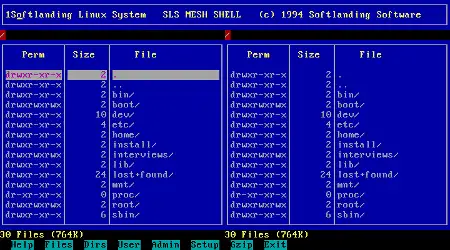Last Updated on: 20th July 2023, 01:54 pm
Web site: (not active)
Origin: Canada
Category: Server, Desktop
Desktop environment: CLI
Architecture: x86
Based on: Independent
Wikipedia: Softlanding Linux System
Media: Install
The last version | Released: 1993.03 ? | March 1993 ?
Softlanding Linux System (SLS) – one of the oldest Linux distributions was generally made minimal or no changes to the original software packages before including them. Distributions using this format generally provided no native software management and depended on third-party utilities for package management and administration.
The release 1.03 of SLS containing kernel 99 alpha p11, libc 4.4.1, gcc 2.4.5 and XFree86 1.3. Linux is a free 386 unix like operating system similar to System V, and developed by Linus Torvalds, plus a few hundred big hearted programmers on the Internet. SLS is produced and GPL copyrighted by Softlanding Software. You may redistribute SLS, as long as you do include both this file, and the file COPYING prominently in the distribution. You may not take credit for the work of others.
SLS is NOT just an image dump of some ones Unix system.
Instead it is a distribution whose primary purposes are:
0) provide an initial installation program (for the queasy).
1) utilities compiled to use minimal disk space.
2) provide a reasonably complete/integrated U*ix system.
3) provide a means to install and uninstall packages.
4) permit partial installations for small disk configs.
5) add a menu driven, extensible system administration.
6) take the hassle out of collecting and setting up a system.
7) give non internet users access to Linux.
8) provide a distribution that can be easily updated.
SLS contains ~600 utilities designed to provide a relatively complete computer operating system for the sophisticated user. It includes programs for compression, text processing, communications, X Windowing system, program development (Assembler, C, C++, Fortran, Pascal, Lisp, and Perl), mail, spreadsheets, and word-processing. Also supported are DOS files, a DOS emulator, SCSI, CDROMs, and TCP/IP. A 387 coprocessor is emulated by the kernel if you don’t have one. Full source code for the kernel is also provided with SLS.
The development environment includes libraries for unix and Xwindows, a debugger that does full screen (via emacs) with support for core dumps.
Shared libraries make the most miserly use of RAM and disk space. FAQ and Manual pages document most of the Linux utilities. SLS requires at least
12 Meg of disk for the minimal install. 90 Meg or more is required for the full system (not including TeX or Interviews). You will need at least 2
Meg of RAM, 4 meg if you want to compile programs, and 8 Meg to run X Windows. Note that sometimes you can get by with less, but usually with
noticeable performance limitations.
SLS was available on floppies (30 5.25 floppies or 25 3.5 floppies), QIC150 or CDROM from the address below for a flat rate distribution fee of US $99
($125 Canadian) + $15 shipping and handling. The SLS CDROM contains the full source tree and a 50+ page user manual “Using SLS”. A quarterly CD (4 CD’s over 1 year) was available for US $199 (255 Canadian) + $15 S&H.
It was founded by Peter MacDonald in May 1992. It was soon superseded by Slackware which started as a cleanup of SLS by Patrick Volkerdin.
The screenshot source: Wikipedia; author: Linuxcenter.ru; License: The copyright holder of this work allows anyone to use it for any purpose including unrestricted redistribution, commercial use, and modification.

